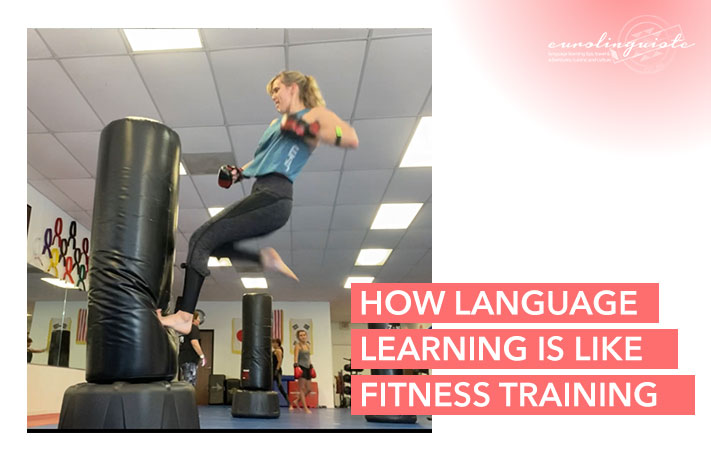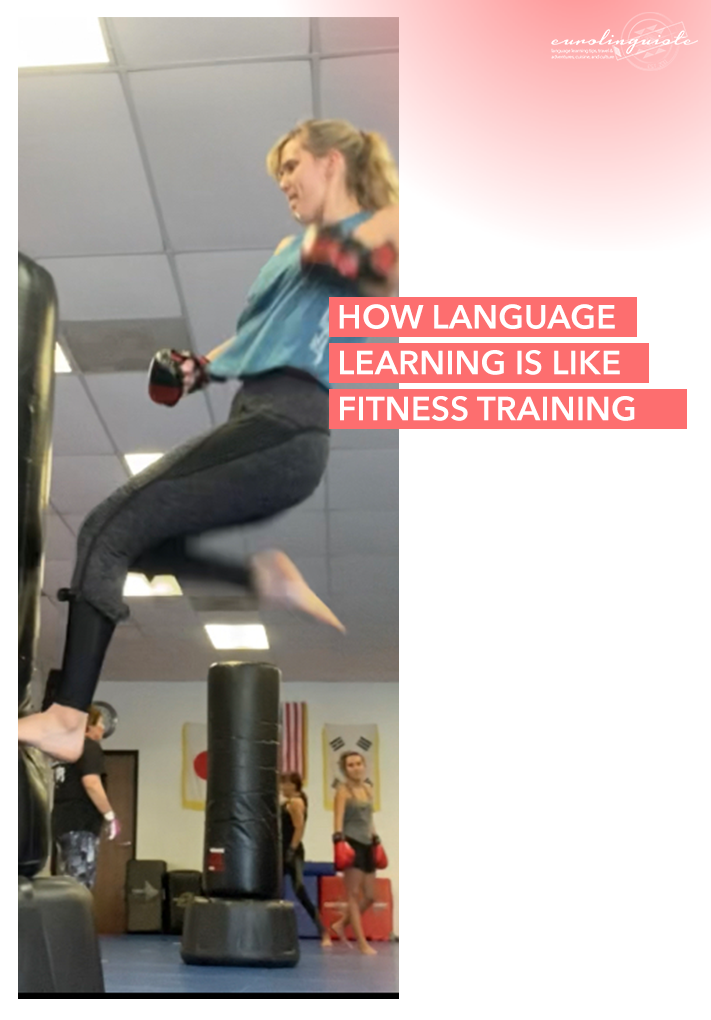How Language Learning is Like Fitness Training

My name is Shannon Kennedy and I'm the language lover,…
Whenever you take on a new skill, like language learning, one of the best things you can do is look at other things you’re already doing and that you’ve already learned.
How did you learn to do it? What resources did you use? How much time did you spend learning it? What didn’t work for you? What was enjoyable about the process of learning that thing?
Relating back to your experience with another skill can give you a big leg up with your new language. Whatever you did to learn that other skill, a lot of it can be applied to language learning, too.
I often relate language learning to music. It’s something that I’ve spent a lot of time studying and I’ve been able to draw on my experience training as a musician in ways that have benefitted my language studies.
More recently, I’ve started to really get into fitness. I have a history with martial arts, but in the last year I’ve also started weightlifting and dance.
And in getting more active, I’ve discovered there are a lot of parallels between training and language learning, too.
Here are just a few of the ways fitness can tie to language learning and how to use the skills you learn exercising to your advance in language.
1 Sustainability is so important.
The reason I’ve only recently gotten into fitness is because, and excuse me for being direct here but, I don’t like it. I did lots of sports as a kid, but I didn’t have the motivation to stick with any of them for long (except softball) and as an adult, I’ve always dreaded going to the gym.
I’d go for a few weeks, not see any changes, give up, and then a few months later start the cycle again while dreading it the entire time. I couldn’t stick with it.
That is, until I discovered my love of martial arts.
As a teenager I had done karate. I only got to yellow belt. It was in a big community center with lots of people, I got really sweaty, and I really didn’t like it. So I stopped.
But then, in my twenties, a friend and co-worker convinced me to try out kung fu with him (he had gotten a groupon package), so we went. After the groupon expired, he dropped out but I stuck with it. I loved it.
At this school, it was taught more as an art than at my previous school. I was able to focus on myself, learn forms, practice movements in coordination with partners, and I got a lot of personal feedback from my instructor. It was exactly what I needed to stick with a sport. And while I’ve switched over to taekwondo, I’m still at it and loving it.
In fact, I love it so much it pushed me to start working on weightlifting so that I would be stronger and in better shape as well as dance so I would be more flexible and fluid in my movements. I’ve been doing weightlifting for nearly a year now and dance for several months. And I don’t plan on giving up any of them.
Whenever someone asks me what the best language learning resource or method is, my answer is always the same. The one you’ll stick with. That’s what it took for me to stick with something I swore I hated—exercise—and it’s what keeps me going with my languages.
There’s no “best” resource out there. Everyone learns different. Everyone is interested in different aspects of their language or its culture. Everyone’s schedules vary enough that certain resources are more accessible than others. There’s no one right resource. Just like there’s no one right form of exercise. That’s why there are so many programs out there—P90X, pilates, yoga, Pelaton, swim, diving, running, you name it.
You want to make sure the resources you’re using support you in a variety of ways… depending on your goals. So, for example, my goals are often conversational. This means I want to find resources for listening, speaking, and learning vocabulary that I’ll keep coming back to day after day.
2 Something is better than nothing.
If I can’t fit an entire workout in or stay for an entire karate class, it’s easy for me to say “meh, I’ll just skip today.” But when it comes to working out, or language learning, something is better than nothing.
Imagine that you planned to study an hour every day this week. If you weren’t ever able to set aside an hour, that’s 0 minutes of study at the end of the week. If you studied 20 minutes here, 15 minutes there. You’d probably have over 2 hours of study at the end of the week that you wouldn’t have had if you skipped a study session because you “didn’t have enough time”.
With a skill like language learning, every minute counts. So if you can’t do a full session, don’t skip it. Just use the time you do have available to you to study.
3 Warm-ups are a good for you.
Before you workout, it’s important to stretch and warm-up. Languages can be the same.
Have you ever shown up for a language exchange or lesson cold? I certainly have. There are plenty of times my lesson is back-to-back with something else I have going on so I don’t have time to get into “Russian mode” or “Japanese mode”. Those lessons typically don’t go as well as the lessons where I get to spend 15 minutes warming up in the language with some reading, vocab review, or study.
Having some sort of transition or warm up into your language practice helps remove some of the resistance and get you feeling more ready and confident.
4 Expect that coming back to it after a break will be tough.
My husband and I recently went on our honeymoon. I was only away from my usual exercise routine for nine days (though we were very active on the trip with hikes, kayaking, snorkeling, swimming, and walks). When I got back it seemed like I lost a lot of what I could do during my workouts. And after, I was sore. Oh was I sore. And as a part of my normal routine, that doesn’t happen often.
After a break, it’s tough to get back into training but it doesn’t take long to get back to where you were. I was gone for about a week and it took me only three days to get back into the swing of things.
I also experienced something similar with my Italian.
You see, when we take a break from our languages, we worry that we’ll forget them. And you do forget a bit, but not as much as you think.
Getting back into your studies, you’ll often find yourself thinking “ugh, I knew that”. But guess what? That’s a good thing. Doing a language refresh, or picking up a language after a break, is a good way to review and better instill what you knew before. You’ll get back up to speed more quickly than you’d imagine. And I find, often enough, that it only takes me a short time before I speedily jump ahead of where I was when I took a break from my language in no time.
5 Overtraining is a real thing.
For a time, I was working out two to three time a day. When I started doing it, I had amazing results, so I thought I had to keep doing it. But then my body rebelled and I was doing more harm than good. Now, I try to limit my workouts to once or twice a day (if I must).
The same is true for language learning.
If you sit down and try to have a ten hour study session, chances are, you’re not going to remember everything you went over in that ten hours. But if you do one hour a day per week, you’re more likely to hang on to what you learned in those seven hours.
Our focus only lasts for so long. And our brain can only handle so much new information in a day
6 You can get over a plateau.
When training, you’ll hit several plateaus with your strength and weight. Breaking through them is a challenge, but you can break through them.
Change things up, take a break, push through it, or push yourself in new ways.
7 You can fit language learning or exercise in, even if you’re really busy.
Finding time and making time for language learning are two different things. I’ve written about time management and making time for language learning on a few different occasions, and with a full-time job, several part-time jobs, kids, and hobbies, it’s a topic that is very important to me.
If you reframe your language learning so that it’s not about a single, solid language learning session each day, you’ll find you’re able to fit more language learning into your schedule.
8 Energy management matters.
Do you find that when it’s time for you to finally start studying your language you don’t have the energy to do it? Figuring out when you have the most energy and how to manage your energy is crucial to getting the most out of your language studies (or workouts).
9 Community is so important.
Remember when I said I fell in love with martial arts when I retried it as an adult? A big part of it was the community at the new school. My teacher was awesome and I enjoyed my fellow students’ company. The same is true of my new martial arts school, my personal trainer for weightlifting and the people at my dance school, too. If I didn’t like the community I became a part of by joining those places, I probably wouldn’t keep showing up.
If you’re not a part of a language learning community. Now is the time to join one. I, of course, recommend Language Conqueror, but there are several more out there including my Reading Challenge community.
What About You?
Do you relate to any of the above? What are strategies you’ve taken from other parts of your life and applied to language learning that have worked for you? Let me know in the comments below!
And if you’re interested in learning more about this topic or joining a supportive group of language learners, then I invite you to join me in Language Conqueror!
As a part of Language Conqueror, you get:
- A video lesson introducing the Quest
- Daily prompts to guide you along the Quest each day
- A workbook with all the exercises and instructions you need to complete the Quest
- A video demonstrating the Quest in action from one of our hosts (or special guests)
- Trade secrets: these are tricks you can use to succeed at your Quest
- A Side-Quest: an action you can take to help you gain the confidence you need to complete your Quest
- Access to the Quest community so you can collaborate with other learners, share what you’re working on, and get support
- Your Quest: the final assignment you complete to put everything you learned over the month into practice
We hope to see you in the next Quest!

My name is Shannon Kennedy and I'm the language lover, traveler, and foodie behind Eurolinguiste. I'm also the Head Coach of the Fluent in 3 Months Bootcamp, co-founder of Women in Language, and former Resident Polyglot at Drops.







